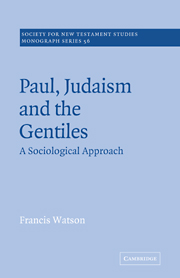Book contents
- Frontmatter
- Contents
- Preface
- Abbreviations
- 1 Paul, the Reformation and modern scholarship
- 2 The origins of Paul's view of the law
- 3 The Galatian crisis
- 4 Philippi, Corinth and the Judaizers
- 5 The situation in Rome
- 6 The social function of Romans: Rom. 2
- 7 The social function of Romans: Rom. 3–4
- 8 The social function of Romans: Rom. 5–8
- 9 The social function of Romans: Rom. 9–11
- 10 Conclusion
- Notes
- Bibliography
- Index
4 - Philippi, Corinth and the Judaizers
Published online by Cambridge University Press: 11 November 2009
- Frontmatter
- Contents
- Preface
- Abbreviations
- 1 Paul, the Reformation and modern scholarship
- 2 The origins of Paul's view of the law
- 3 The Galatian crisis
- 4 Philippi, Corinth and the Judaizers
- 5 The situation in Rome
- 6 The social function of Romans: Rom. 2
- 7 The social function of Romans: Rom. 3–4
- 8 The social function of Romans: Rom. 5–8
- 9 The social function of Romans: Rom. 9–11
- 10 Conclusion
- Notes
- Bibliography
- Index
Summary
A warning to the Philippians
A Place and time of writing
Like 1 Corinthians (cf. 1 Cor. 16:8f), Philippians was probably written from Ephesus during the three-year stay there which began soon after the second visit to Galatia (Acts 19:Iff; 20:31). It is true that there is no certain evidence for Paul having been imprisoned in Ephesus, whereas in Philippians it is clear that Paul is writing from prison (1:7, 13f, 17). But in 1 Cor. 16:9, he mentions his many adversaries there, and in 15:32 he seems to be contemplating the possibility of ‘fighting with wild beasts’ in the theatre there. (Paul cannot be there referring to an incident which has already taken place, for v.32 requires his death to function as an argument for the resurrection of the dead: i.e. ‘If the dead are not raised, what would I gain if I ended my life in the arena at Ephesus, as may well happen?’) In 2 Cor. 6:5 and 11:23, he mentions ‘imprisonments’ among his sufferings. He tells in 2 Cor. 1:8–10 of his recent experiences at Ephesus:
For we do not want you to be ignorant, brethren, of the affliction we experienced in Asia; for we were so utterly, unbearably crushed that we despaired of life itself. Why, we felt that we had received the sentence of death; but that was to make us rely not on ourselves but on God who raises the dead; he delivered us from so deadly a peril, and he will deliver us…
- Type
- Chapter
- Information
- Paul, Judaism, and the GentilesA Sociological Approach, pp. 73 - 87Publisher: Cambridge University PressPrint publication year: 1986



